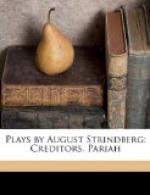Personally, I am inclined to doubt whether a Tekla can be found in the flesh—and even if found, she might seem too exceptional to gain acceptance as a real individuality. It must be remembered, however, that, in spite of his avowed realism, Strindberg did not draw his men and women in the spirit generally designated as impressionistic; that is, with the idea that they might step straight from his pages into life and there win recognition as human beings of familiar aspect. His realism is always mixed with idealism; his figures are always “doctored,” so to speak. And they have been thus treated in order to enable their creator to drive home the particular truth he is just then concerned with.
Consciously or unconsciously he sought to produce what may be designated as “pure cultures” of certain human qualities. But these he took great pains to arrange in their proper psychological settings, for mental and moral qualities, like everything else, run in groups that are more or less harmonious, if not exactly homogeneous. The man with a single quality, like Moliere’s Harpagon, was much too primitive and crude for Strindberg’s art, as he himself rightly asserted in his preface to “Miss Julia.” When he wanted to draw the genius of greed, so to speak, he did it by setting it in the midst of related qualities of a kind most likely to be attracted by it.
Tekla is such a “pure culture” of a group of naturally correlated mental and moral qualities and functions and tendencies—of a personality built up logically around a dominant central note. There are within all of us many personalities, some of which remain for ever potentialities. But it is conceivable that any one of them, under circumstances different from those in which we have been living, might have developed into its severely logical consequence—or, if you please, into a human being that would be held abnormal if actually encountered.
This is exactly what Strindberg seems to have done time and again, both in his middle and final periods, in his novels as well as in his plays. In all of us a Tekla, an Adolph, a Gustav—or a Jean and a Miss Julia—lie more or less dormant. And if we search our souls unsparingly, I fear the result can only be an admission that—had the needed set of circumstances been provided—we might have come unpleasantly close to one of those Strindbergian creatures which we are now inclined to reject as unhuman.
Here we have the secret of what I believe to be the great Swedish dramatist’s strongest hold on our interest. How could it otherwise happen that so many critics, of such widely differing temperaments, have recorded identical feelings as springing from a study of his work: on one side an active resentment, a keen unwillingness to be interested; on the other, an attraction that would not be denied in spite of resolute resistance to it! For Strindberg does hold us, even when we regret his power of doing so. And no one familiar with the conclusions of modern psychology could imagine such a paradox possible did not the object of our sorely divided feelings provide us with something that our minds instinctively recognise as true to life in some way, and for that reason valuable to the art of living.




